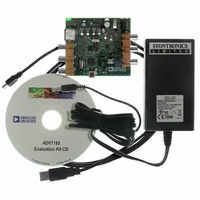EVAL-ADV7180LFEBZ Analog Devices Inc, EVAL-ADV7180LFEBZ Datasheet - Page 43

EVAL-ADV7180LFEBZ
Manufacturer Part Number
EVAL-ADV7180LFEBZ
Description
BOARD EVAL FOR ADV7180 LFCSP
Manufacturer
Analog Devices Inc
Specifications of EVAL-ADV7180LFEBZ
Main Purpose
Video, SDTV Video Decoder - NTSC, PAL, SECAM
Embedded
No
Utilized Ic / Part
ADV7180
Primary Attributes
CVBS (Composite), Y/C (S-video), and YPrPb (Component) Inputs
Secondary Attributes
8-bit ITU-R BT.656 YCrCb 4:2:2 Output
Lead Free Status / RoHS Status
Lead free / RoHS Compliant
Available stocks
Company
Part Number
Manufacturer
Quantity
Price
Company:
Part Number:
EVAL-ADV7180LFEBZ
Manufacturer:
Analog Devices Inc
Quantity:
135
AV CODE INSERTION AND CONTROLS
This section describes the I
following:
•
•
•
•
Some of the decoded VBI data is inserted during the horizontal
blanking interval. See the Gemstar Data Recovery section for
more information.
BT.656-4, ITU-R BT.656-4 Enable, Address 0x04[7]
Between Revision 3 and Revision 4 of the ITU-R BT.656 standards,
the ITU has changed the toggling position for the V bit within
the SAV EAV codes for NTSC. The ITU-R BT.656-4 standard
bit allows the user to select an output mode that is compliant
with either the previous or new standard. For further information,
visit the International Telecommunication Union website.
Note that the standard change only affects NTSC and has no
bearing on PAL.
When ITU-R BT.656-4 is 0 (default), the ITU-R BT.656-3
specification is used. The V bit goes low at EAV of Line 10
and Line 273.
When ITU-R BT.656-4 is 1, the ITU-R BT.656-4 specification is
used. The V bit goes low at EAV of Line 20 and Line 283.
SD_DUP_AV, Duplicate AV Codes, Address 0x03[0]
Depending on the output interface width, it may be necessary to
duplicate the AV codes from the luma path into the chroma path.
In an 8-bit wide output interface (Cb/Y/Cr/Y interleaved data),
the AV codes are defined as FF/00/00/AV, with AV being the
transmitted word that contains information about H/V/F.
Insertion of AV codes into the data stream
Data blanking during the vertical blank interval (VBI)
The range of data values permitted in the output data stream
The relative delay of luma vs. chroma signals
Cr/Cb DATA BUS
Y DATA BUS
FF
FF
2
C-based controls that affect the
16-BIT INTERFACE
AV CODE SECTION
SD_DUP_AV = 1
00
00
00
00
Figure 34. AV Code Duplication Control (64-Lead LQFP Only)
AV
AV
Cb
Y
Rev. F | Page 43 of 116
AV CODE SECTION
FF
00
16-BIT INTERFACE
In this output interface mode, the following assignment takes
place: Cb = FF, Y = 00, Cr = 00, and Y = AV.
In a 16-bit output interface (64-lead LQFP only), where Y and
Cr/Cb are delivered via separate data buses, the AV code is
spread over the whole 16 bits. The SD_DUP_AV bit allows the
user to replicate the AV codes on both buses; therefore, the full
AV sequence can be found on the Y bus as well as on the Cr/Cb
bus (see Figure 34).
When SD_DUP_AV is 0 (default), the AV codes are in single
fashion (to suit 8-bit interleaved data output).
When SD_DUP_AV is 1, the AV codes are duplicated (for
16-bit interfaces).
VBI_EN, Vertical Blanking Interval Data Enable,
Address 0x03[7]
The VBI enable bit allows data such as intercast and closed
caption data to be passed through the luma channel of the decoder
with a minimal amount of filtering. All data for Line 1 to Line 21 is
passed through and available at the output port. The ADV7180
does not blank the luma data and automatically switches all filters
along the luma data path into their widest bandwidth. For active
video, the filter settings for YSH and YPK are restored.
See the BL_C_VBI, Blank Chroma During VBI, Address
0x04[2] section for information on the chroma path.
When VBI_EN is 0 (default), all video lines are filtered/scaled.
When VBI_EN is 1, only the active video region is filtered/scaled.
AV
00
Cb
Y
SD_DUP_AV = 0
INTERLEAVED
Cb/Y/Cr/Y
FF
AV CODE SECTION
8-BIT INTERFACE
00
00
AV
ADV7180
Cb



















